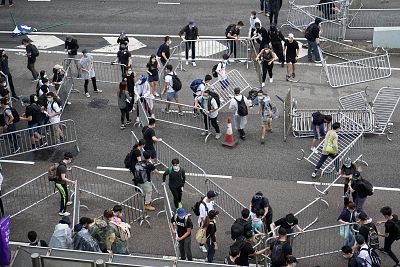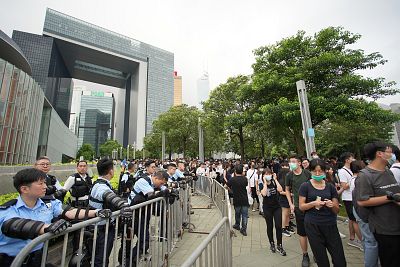Demonstrations again erupted over the measure that would clear the way for Hong Kong to send people to mainland China to face charges.
HONG KONG — Thousands of demonstrators, dressed in black, swarmed the area surrounding Hong Kong's central government complex on Wednesday morning to protest legislation that would allow extraditions to mainland China for trial.
 ADVERTISEMENT
ADVERTISEMENT
 ADVERTISEMENT
ADVERTISEMENT
Police in riot gear monitored the protest as demonstrators equipped with police barriers, street signs and trash barrels blocked off Harcourt Road, a major thoroughfare in the government district.
Many of the protesters, who carried medical masks and goggles expecting police to use tear gas, said they were taking part in a territory-general strike, which has been endorsed by more than 1,000 small businesses and the 190,000-member Hong Kong Confederation of Trade Unions, which called on "all workers to suspend work and join the assembly."
Michael Vidler, a human rights lawyer based in Hong Kong, said he told his employees that the firm would back them if they chose to join the strike.
Vidler told NBC News that "people are terrified, in my view rightly so," that the legislation would remove the "fire wall" between Hong Kong and China.
The broadly disliked measure would amend extradition laws to allow Hong Kong to send people to mainland China to face charges. It was scheduled for further debate in the Legislative Council, which is controlled by a pro-Beijing majority, later on Wednesday.
The new protests come three days after as many as 1 million people took to the streets in what was described as the largest demonstration in the semi-autonomous territory since China assumed control from Britain in 1997.
At one point on Wednesday, dozens of protesters opened colorful umbrellas in what appeared to be a call back to the so-called Umbrella Revolution protests of 2014, when changes in Hong Kong's electoral laws were rammed through that were seen as highly favorable to Beijing.
Under the principle of "one country, two systems," Hong Kong is to retain its own economic and administrative system free of interference from Beijing until 2047, but critics say the legislation would represent another step on the road to Beijing's seizing premature control over the former colony.
News
The chief executive of Hong Kong, Carrie Lam, has tried to allay concerns by introducing amendments that she says would add safeguards to the legislation. Supporters say the bill would help stop Hong Kong from becoming a haven for fugitives from China, which doesn't have an extradition agreement with Hong Kong.
Morgan Ortagus, a spokeswoman for the State Department, said Monday that the United States had expressed "grave concern" about the measure, which she said could "undermine Hong Kong's autonomy and negatively impact the territory's longstanding protections of human rights, fundamental freedoms and democratic values."
"We are also concerned that the amendments could damage Hong Kong's business environment and subject our citizens residing in or visiting Hong Kong to China's capricious judicial system," she said.
Justin Solomon reported from Hong Kong. Alex Johnson reported from Los Angeles.
This is a developing story. Refresh this page for updates.












